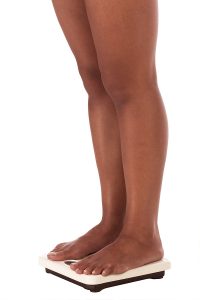The evidence is clear that obesity and greater abdominal fat increases the risk of post-menopausal breast cancer; obesity decreases the risk of pre-menopausal breast cancer. Yet the majority of research in the field has been conducted among Caucasians.
A study presented today suggests that higher BMI increases the risk of a more advanced cancer diagnosis among women of African ancestry.
The study by Elisa V. Bandera, a researcher at the Cancer Institute of New Jersey, was a poster session today at the American Association for Cancer Research’ annual meeting.
“We know the effect of obesity on breast cancer among white women, there’s a wide literature on the topic,” said lead author Bandera, who is also an expert panelist on AICR’s Continuous Update Project. “In general, African Americans tend to have breast cancer at an earlier age and it is more advanced, we know something different is going on, we want to find out what.”
Bandera and her colleagues looked at body size, fat distribution, and breast cancer risk among African American and Caucasian women ages 20-75 who were participants in the Women’s Circle of Health Study. There were 810 cases of breast cancer and 1022 controls.
Overall, for both premenopausal and postmenopausal there was no increased risk for cancer risk incidence. For premenopausal women, both greater waist and hip circumference lined to increased risk, independent of BMI. But for both pre- and postmenopausal breast cancer, a higher BMI was linked to a more advanced cancer diagnosis and larger tumors.
It’s possible the more advanced tumors related to BMI are due to higher levels of estrogen or other hormones, says Bandera.
About half of African American women are obese, compared to about one-third of Caucasian women, notes Bandera. Although BMI was not directly related to incidence, she says, because it is linked to a more advanced cancer that is one important reason for women to pay attention to their weight.
“We need more studies on this topic,” says Bandera. “Now, this research is clearly showing that it’s so important for African American women to maintain a healthy weight.”






Networking more on this information in the communities and in the doctor office can be helpful reaching out to women of color. In my menopause years I gained over 40 or more pounds. I need help in getting tis weight off before health issues follow.
Networking more on this information in the communities and in the doctor office can be helpful reaching out to women of color. In my menopause years I gained over 40 or more pounds. I need help in getting tis weight off before health issues follow.